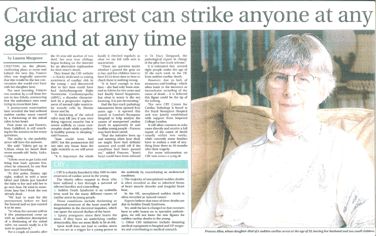Chatting on the phone confirming plans to come and babysit the next day. Frances Allen was tragically unaware that this would be the last conversation she would ever have with her daughter Jane.
The next morning, Frances was awoken b a call from her son-in-law, Edwin, announcing that the ambulance men were trying to resuscitate Jane.
A post mortem examination later revealed she had suffered sudden cardiac arrest caused by a thickening of the mitral valve in her heart.
Four years on and Frances, from Guildford, is still searching for the answers to her many questions.
The reality is, she probably never will have the answers.
She said: “Edwin got up at 5.30am when he heard their seven month-old baby, Luke, crying.
“Edwin went to get Luka and bring him back upstairs but, when he returned, he saw that Jane wasn’t breathing.
“At this point, Emma, age eight, walked in with a nose bleed and Edwin just handed the baby to her and told her to go next door. He tried to resuscitate Jane but I think she was already dead.
“We had to wait for the post mortem before we had the funeral and we just wanted it to be over.
“So when the coroner told us it (the post mortem) came up with an ineffective description of a thickening of the mitral valve, we weren’t really in a fit state to question it.”
But a couple of months after the 35-year old mother of two died, her own four siblings began looking on the internet for an alternative explanation for their sister’s death.
They found the CRY website – a charity dedicated to raising awareness of cardiac risk in the young – and discovered that in fact Jane could have had Arrhythmogenic Right Ventricular Cardiomyopathy (ARVC), a disorder characterised by a progressive replacement of normal right ventricular muscle cells by fibrous tissue and fat.
“A thickening of the mitral valve may kill you if you were doing vigorous exercise but it seems unlikely to cause catastrophic death while a perfectly healthy person is sleeping,” said Frances.
“Jane could have had ARVC but the post mortem did not take any tissue from the right ventricle so we will never know.
“It is important the whole family is checked regularly as what we are left with now is uncertainty.
“There are question marks whether I passed the gene on to her, and her children have to have ECGs from time to time to check there is nothing wrong.
“It is hard enough to lose Jane – she had only been married to Edwin for two years and had finally found happiness. But what is worse is the not knowing. It is just devastating.”
Had the fast-track pathology laboratories been opened four months ago – it opened this month at London’s Brompton Hospital to help analyse the causes of unexpected cardiac death in apparently fit and
healthy young people – Frances may have been saved.
“Had the initiative been up and running when Jane died, we might have had definite answers and could tell if the condition had been passed on,” added Frances. “Jane’s heart could have been referred to Dr Mary Sheppard, the pathological expert in charge of the pilot fast-track scheme.”
It is estimated that around eight people under the age of 35 die each week in the UK from sudden cardiac death.
However, due to lack of awareness and funding – which often leads to the incorrect or inconclusive recoding of the cause of death – it is believed this figure could be the tip of the iceberg.
The new CRY Centre for Cardiac Pathology is based at the Royal Brompton Hospital and was jointly established with support from Imperial College London.
It will allow coroners to refer cases directly and receive a full report of the cause of death usually within two weeks, while currently some families have to endure a wait of anything from three to 18 months after their tragedy.
For more information on CRY visit
CRY
Cry is a charity founded in May 1995 to raise awareness of cardiac arrest in the young.
The charity offers support to those who have suffered a loss through a network of affected families and counselling.
Sudden Death Syndrome is an umbrella term used for many different causes of cardiac arrest in young people.
These conditions include thickening or abnormal structure of the heart muscle and irregularities in the electrical impulses, which can upset the natural rhythm of the heart.
Sporty youngsters stress their hearts the most. If they have an underlying cardiac abnormality, they are more likely to be at risk.
Sport itself does not lead to cardiac arrest but can act as a trigger for a young person to die suddenly by exacerbating an undetected condition.
The majority of unexplained sudden deaths is often recorded as due to inherited forms of heart muscle disorder and irregular heart beat.
In the UK, unexplained sudden death is often recorded as ‘natural causes.’
Experts believe that most of these deaths are due to Sudden Death Syndrome.
Yet, until the law is changed so that coroners have to refer hearts onto specialist pathologists, we will not know the true figures for sudden cardiac deaths in the young.
Other CRY initiatives include donating medical equipment to hospital and GP surgeries and contributing to medical research.







